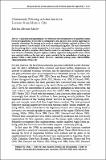| dc.description.abstract |
Community policing programmes are widely perceived and promoted as an important solution for the pressing problems of insecurity in contemporary Latin American cities, and for improving citi- zen-police relationships. By drawing on the results of empirical fieldwork conducted in Mexico City, the article presents a critical analysis of the local community policing effort. The article demonstrates that this policing effort is overly determined by a local context, characterized by clientelism, political factionalism and police corruption, which therefore renders its contribution to a sustainable improve- ment of local accountability and police legitimacy unlikely. Against this background the article calls for more empirical studies on this topic and a greater sensitivity for the embeddedness of policing pro- grammes within a wider political context. |

